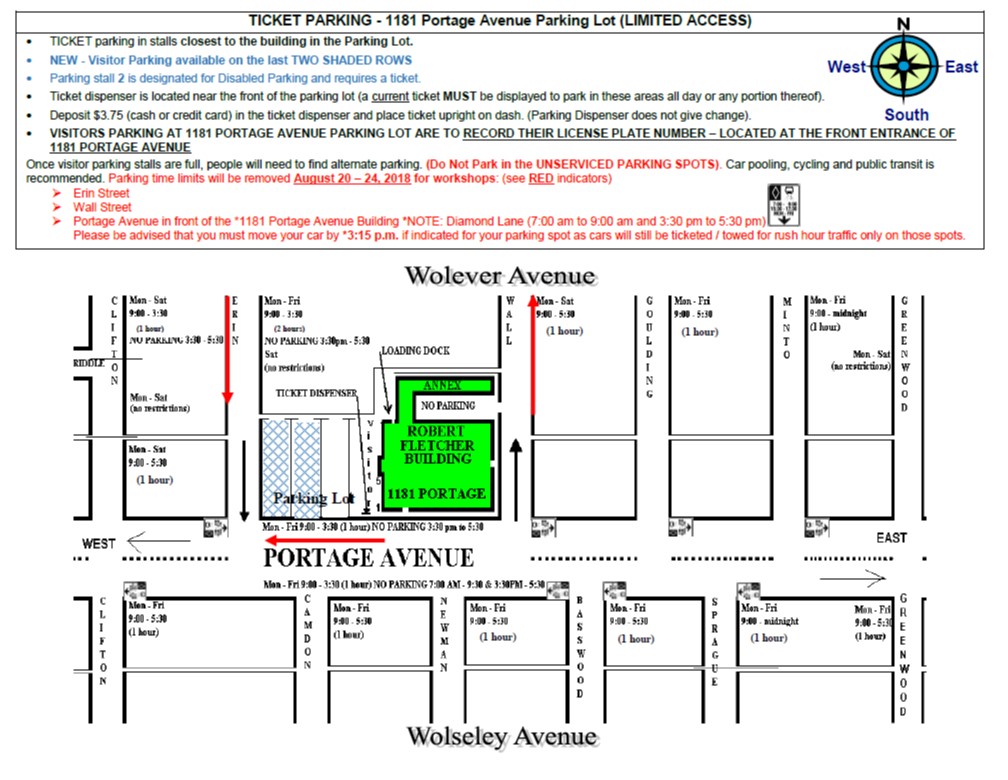
2018 Student Services Unit Summer Institute
Date and time
Location
Robert Fletcher Building
1181 Portage Avenue Winnipeg, Manitoba R3G 0T3 CanadaDescription
Student Services Unit Summer Institute August 20 - 24, 2018
Monday, August 20, 2018
Supporting Inclusive Classrooms: Appropriate Educational Programming For All Students
9:00 a.m. – 3:30 p.m. ♦ Available On-Line
This session will review programming used to meet the diverse learning needs of individual students in an inclusive classroom. Differentiated instruction, adaptations, modification of learning outcomes, and individualized programming will be reviewed. There will be an opportunity to work through the process of student-specific planning. The standards for student assessment and reporting to parents on expected learning outcomes will be discussed.
Tuesday, August 21, 2018
Supporting Students with Mathematics Disabilities
9:00 a.m. – 11:30 p.m. ♦ Available On-Line
In this session, educators will discuss the definition of a math learning disability and a collaborative process for assessment and supporting student learning. By examining the way students think and learn, we will explore evidence-based practice that has been demonstrated to be effective. The goal of the day will be to create a Self-Regulated Strategy Development Model that can be used to teach students in your math classroom.
--------------------------------
Reading and Writing and Learning Disability-Teaching the Individual: Linking Assessments with Instruction
1:00 a.m. – 3:30 p.m. ♦ Available On-Line
The emphasis in this workshop will centre around using information from multiple assessments of Oral language, reading, and writing to plan appropriate learning experiences for children who find literacy learning challenging.
--------------------------------
A Four-Component Approach for Transition from School to Community Living disABILITY Service (CLdS)
9:00 a.m. – 11:30 a.m.
For a student transitioning from school to community, a desired life path and goals can be determined through a person-centred planning approach. For those identified for transitioning to Community Living disABILITY Services (CLdS), support needs could be used to inform measurable student-specific outcomes in the IEP. The presenters will share strategies for aligning the person-centred plan, the Supports Intensity Scale and the IEP process. How could/should school professionals bring information together to shift from school-focussed approaches to adult focussed programming?
Participants will collaborate using actual case studies to inspire their thinking about high school programming that supports transition planning.
--------------------------------
Student Mental Health and Well-Being
1:00 p.m. – 3:30 p.m.
This session will explore current models that assist in understanding and programming for student mental health and well-being. Participants will examine the perspectives from the Safe and Caring Schools: A Whole-School Approach to Planning for Safety and Belonging. There will be opportunities to discuss and share strategies that support learners with mental health needs within inclusive learning environments.
Wednesday, August 22, 2018
Day 1—Manitoba Provincial FASD Training
(Participants must attend both days)
8:30 a.m. – 4:00 p.m.
This 2-day session provides both a philosophical and practical context to understanding Fetal Alcohol Spectrum Disorder in Manitoba. Collaborators from a range of service providers developed the training as a response in part to Calls to Action #33 and #34 from the Truth and Reconciliation Commission of Canada. The specific objectives of the training are:
- To understand the context of alcohol use in Manitoba
- To understand and address the circumstances that complicate life before, during and after pregnancy
- To gain a basic understanding of FASD
- To understand and practice successful approaches when supporting people who have FASD
--------------------------------
Resource Service Delivery Models and Working with Educational Assistants
9:00 a.m. – 11:30 a.m. ♦ Available On-Line
This session will provide an overview of the resource service delivery models that schools/school divisions may use to support the diverse needs of students. Participants in the session will examine models (Consultative-Collaborative, Co-teaching, Response to Intervention, and Universal Design) that are used individually or in combination to support Manitoba’s philosophy of inclusion. This session will also examine the possible roles and responsibilities of educational assistants in inclusive schools.
--------------------------------
ADHD: Strategies to Support Well-Being and School Functioning
1:00 pm. – 3:30 p.m.♦ Available On-Line
Participants will increase their understanding of ADHD as a medical neurobiological condition affecting academic, social and emotional areas in a student’s life. Concepts of resiliency and restorative practices will be explored in relation to the promotion of student wellbeing and academic success. This workshop will provide participants an opportunity to learn, network and discuss strategies to support students with ADHD in the classroom and school community.
--------------------------------
safeTALK—Suicide Alertness for Everyone
1:00 pm. – 4:00 p.m.
This interactive workshop developed by Living Works alerts one to the warning signs indicating risk of suicide and emphasizes the importance of recognizing the signs, communicating with the person at risk and getting help or resources for the person at risk. As a safeTALK-trained suicide alert helper, you will be better able to:
- Move beyond common tendencies to miss, dismiss or avoid suicide
- Identify people who have thoughts of suicide
- Apply the TALK steps (Tell, Ask, Listen, and KeepSafe) to connect a person with suicide thoughts to suicide first aid, intervention caregivers.
Thursday, August 23, 2018
Day 2—Manitoba Provincial FASD Training
(Participants must attend both days)
8:30 a.m. – 4:00 p.m.
This 2-day session provides both a philosophical and practical context to understanding Fetal Alcohol Spectrum Disorder in Manitoba. Collaborators from a range of service providers developed the training as a response in part to Calls to Action #33 and #34 from the Truth and Reconciliation Commission of Canada. The specific objectives of the training are:
- To understand the context of alcohol use in Manitoba
- To understand and address the circumstances that complicate life before, during and after pregnancy
- To gain a basic understanding of FASD
- To understand and practice successful approaches when supporting people who have FASD
--------------------------------
English as an Additional Language-Literacy, Academics and Language (LAL) Numeracy Courses for Newcomers
9:00 a.m. – 11:30 a.m.♦ Available On-Line
These brand new provincial courses will offer LAL students opportunity to develop background knowledge and numeracy skills to enable them to transition easily into mainstream mathematics classes. The curriculum is designed to address the mathematical and language needs of individual LAL students in a culturally sensitive classroom. Student Support Staff will benefit from this interactive presentation when helping newcomer students with refugee backgrounds and/or students with interrupted education in high school settings.
--------------------------------
WRAP/Circle of Care and EBD 3
9:00 a.m. – 11:30 a.m.
It is difficult to recognize children’s underlying needs because children’s behaviors are often the focus of families, other caregivers, teachers and service providers. We tend to jump to a service to “fix” a problem behavior. This session is for individuals who are working with Wraparound and/or Circle of Care Plans and is designed to help individuals and teams to: become more comfortable with the concept of needs; improve in identifying the underlying needs; reach agreement about the most important needs and stay focused on addressing and meeting those needs. This will include brainstorming, goal setting and selecting the best options and interventions to meet needs and set bench marks.
--------------------------------
The Trauma Informed Classroom
1:00 p.m. – 3:30 p.m. ♦ Available On-Line
This experiential workshop will provide an overview and understanding of trauma. Considerations of best practices will be explored. Participants will be invited to engage in group discussion about practical strategies, interventions and supports for sustainable, inclusive classrooms. We will highlight the significant role of relationships from the perspectives of both self-care and co-regulation and what this means to our work with students.
Friday, August 24, 2018
Integrating Indigenous Perspectives in Literacy and Numeracy
9:00 a.m. – 11:30 p.m.
Imagine a young girl running through the woods with rocks in her pockets and a sling shot in one hand. This young girl grew up learning the ways of the land alongside classroom teachings. During the day she learned how to read and write. In the evenings she would spend time on the land climbing trees, gathering berries, hunting small animals, and reading weather. She grew up learning different kinds of literacies. She grew up to be a teacher. With these teachings, she spent all of her hours finding ways of nurturing self-esteem in Indigenous students and integrating Indigenous perspectives into the classroom. In this session, she will demonstrate the many ways educators can nurture self-esteem in Indigenous students and learn how to integrate Indigenous perspectives into literacy and numeracy.
Professional Development Credit Information
Participation in at least two full days of Summer Institute 2018 will provide participants with Professional Development credit [Section 2(b)] toward the Special Education Teacher certificate, School Counsellor certificate
In order to acquire professional development credit, On-Line participants must show evidence of participation (e.g., text interaction/questions, etc.)
Additional Information
Please note: The MAPLE platform has been updated. If you are already a member, please log in to "switch your existing MAPLE account" at http://mapleforem.ca/en/. If not yet a member, please join MAPLE as soon as possible as registrants will not be able to access session hand‑outs unless they have joined MAPLE in advance.
Hand-outs will be posted on MAPLE in the 2018 SSU Summer Institute group during the week before the Summer Institute. Paper handouts will not be available at the sessions.
If you are unable to register because a session is full, please notify Brenda Medeiros to be placed on the waiting list or if you have registered for a session and are unable to attend, please notify Brenda Medeiros as early as possible at brenda.medeiros@gov.mb.ca or 204-945-7912.
Also please let Brenda know in advance if you require accommodations due to special needs.
Keep the air we share scent-free. Please do not use scented products at any Student Services Unit Summer Institute sessions while participating at 1181 Portage Avenue.
Parking Information
Parking is available in the lot beside 1181 Portage Avenue.
See the attached map for information. Parking is $3.75 per day. The parking dispenser uses exact change (toonies, loonies, quarters) or credit card. Parking time restrictions will be lifted on Erin and Wall Street between Portage Avenue and Wolever for the week. Other parking restrictions on the street will still apply (loading zones, etc.).
